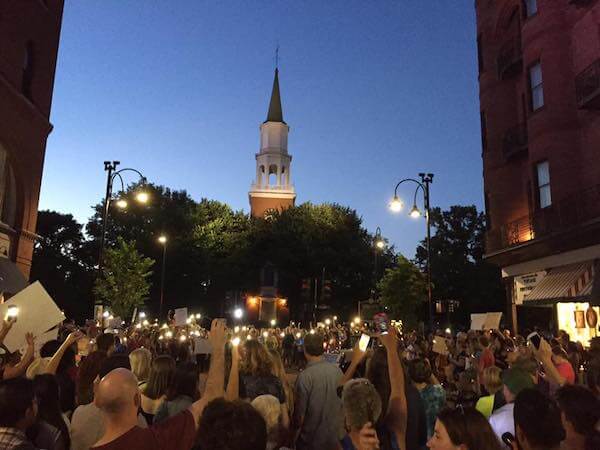Dear TBD Community,
I’m am writing to you in response to the horrific events of this past week. In this time of hurt, fear, and deep pain, I wish to share with you some of the wisdom offered to us by our tradition. Such a demonstration of hate against us, unfortunately, is not uncommon in our history, and many are the texts that deal with the appropriate and necessary responses. My own need to find some solace, some response to all this hate, drove me into these traditions, into our traditions.
As I have been preparing for our most holy of days which will begin in earnest a little more than a month from now, a phrase from our beautiful machzor (High Holiday prayer book) jumped out at me. It was a phrase I had seen before; it is the phrase that can be found inscribed on the wall as one exits from the main building at Yad VaShem, the Holocaust museum in Jerusalem. Both in our prayer book and on that wall it reads, “Forgetfulness leads to exile; while remembrance is the secret of redemption.” These are words spoken by the great rabbi, the holy Baal Shem Tov.
As our community reels from the shock of the events that have occurred in the last few days, both in our country and here in our home, we must take this message of the Baal Shem Tov to heart. We must remember and we must allow ourselves to open our eyes to an ugly pattern that is resurfacing.
How is it that memory can bring about a better world? There is a story of a rabbi, Rabbi Zvi Elimelech, who in the middle of the celebration of Purim suddenly ceased the festivities and turned to his students and said, “Prepare the carriages, it is time for us to fulfill the commandment that appears at the end of the megillah. It is time to blot out Amalek!” The students were scared. They did not understand, but, trusting their rabbi, they prepared the carriages, got in, and took off into the night. The rabbi had the carriages drive down to the nearest inn which was filled with cossacks who were well into their nightly drinking. The rabbi got out of the carriage and strode into the inn, his students cowering behind him. As he walked in, he looked around and picked out the biggest cossack, the one who was obviously in charge, and walked right over to him.
The rabbi stuck out his hand, palm up, and asked the Cossack to dance. There was a silence that swept the room before the Cossack slapped his hand down into the rabbi’s waiting palm and they began to dance wildly throughout the room. The students all went and found their own Cossack partners and soon everyone was tearing up the dance floor.
At the end of the song, the rabbi turns to his partner and says, “I heard that there is a pogrom planned for tomorrow.” The Cossack looked sheepishly at the floor and grumbled in affirmation. The rabbi said, “There will be no pogrom tomorrow.” The Cossacks face brightened and they began to dance again in agreement, hugging and kissing. Needless to say, many drinks were shared as they all danced into the night.
In a moment like this, we must look back at the far too common plague of anti-Semitism that has been written into far too many pages of our Jewish history. We must remember the likes of Amalek, of Haman, and of Hitler who tried to wipe us from the face of the Earth. And in remembering, we must remember what our rabbis have taught us: to destroy our enemies through dance, through coming together.
Perhaps Berurya, one of the wise women quoted in our Talmud says it best in Berachot 10a:
There were these hooligans in Rabbi Meir’s neighborhood who caused him a great deal of anguish. Rabbi Meir prayed for God to have mercy on them, that they should die. Rabbi Meir’s wife, Berurya, said to him: What is your thinking? On what basis do you pray for the death of these hooligans? Do you base yourself on the verse, as it is written: “Let sins cease from the land” (Psalms 104:35), which you interpret to mean that the world would be better if the wicked were destroyed? But is it written, let sinners cease?” Let sins cease, is written. One should pray for an end to their transgressions, not for the demise of the transgressors themselves.
Moreover, go to the end of the verse, where it says: “And the wicked will be no more.” If, as you suggest, transgressions shall cease refers to the demise of the evildoers, how is it possible that the wicked will be no more, i.e., that they will no longer be evil? Rather, pray for God to have mercy on them, that they should repent, as if they repent, then the wicked will be no more, as they will have repented.
Rabbi Meir saw that Berurya was correct and he prayed for God to have mercy on them, and they repented.
Let us come together to pray that this wickedness that has shown its face once again to leave our world, and let us accomplish that goal by being in relationship with others, crying with others, comforting others, celebrating with others, and dancing together with all.
Sincerely,
Rabbi Winship




